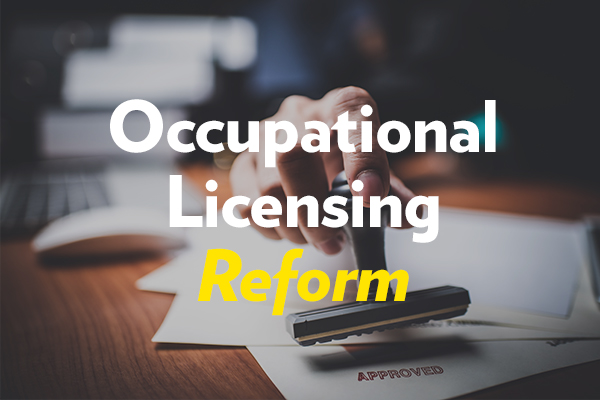Press Release

Occupational Licensing Reform Passes Unanimously, Goes to Wolf
June 25, 2020, Harrisburg, Pa. — The Pa. General Assembly unanimously passed SB 637 (Sens. DiSanto and Schwank), a bill that will remove professional licensing employment barriers for roughly 3 million Pennsylvanians with criminal records, yesterday. The bill is on its way to Gov. Tom Wolf's desk and he is expected to sign it, having voiced support for similar reforms.
This monumental bill's passage comes amid a flurry of legislation aimed at improving the state's justice system. Parallel House legilsation (HB 1477) had been introduced by Reps. Delozier and Harris.
Commonwealth Foundation Senior Policy Analyst Jessica Barnett issued the following statement:
Broad occupational licensing rules disproportionately harm economically disadvantaged citizens and protect industry special interests without making those industries any safer.
In Pennsylvania, those rules especially harm returning citizens, despite a job being key in deterring repeat criminal behavior. They can be disqualified from earning licenses in specific occupations even if their original charge had no relation to the license. And many are barred from obtaining a license even after taking the opportunity to be trained while in prison.
Thankfully, lawmakers from both sides of the aisle have come to recognize the inherent unfairness of these unnecessary barriers to employment. By sending this bill to the governor's desk, lawmakers have ensured such restrictions no longer stand in the way of those who need employment the most.
We should all be proud of this effort to help returning citizen to be crime-free by finding the dignity of work.
If signed, SB 637 will:
- Create clear, accessible standards and best practices for boards when considering applicants with criminal records.
- Provide individualized consideration of applicants. Automatic bans on licensure would be limited to sex crimes, serious crimes of violence, or drug trafficking offenses.
- Limit licensing boards to only considering criminal conduct directly related to the occupation.
- Remove vague licensing law language and limit license denial for those with felony convictions showing substantial risk. This will eliminate the use of renown opaque regulatory phrases such as “moral turpitude” and “good moral character” to deny licenses.
- Allow people to receive preliminary licensing decisions.
- Grant restricted licenses to people trained in state correctional institutions.
Commonwealth Foundation experts are available for comment. Please contact Michael Torres at 850-619-2737 or [email protected] to schedule an interview.
# # #
The Commonwealth Foundation transforms free-market ideas into public policies so all Pennsylvanians can flourish.